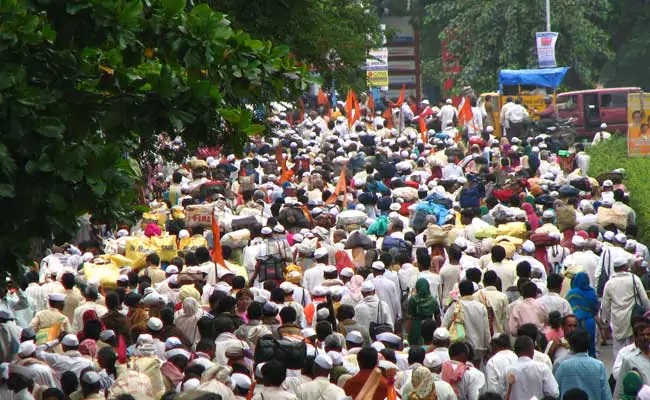The impact of population growth can be grouped into two broad categories- Social Impacts and Ecological impacts.
Social Impacts of Population Growth
Explosive growth in human population causes a number of serious problems like food-scarcity, overcrowding, poverty, increasing consumption, encroachment on monuments, stress on common social facilities, stress on civic services etc.
A. Food Scarcity: The population growth leading to population explosion causes severe economic disparities and gives birth to – competition for resources, price rise, hunger, malnutrition, and mass starvation.
The gap between the rich and the poor has increased due to population growth. The rich people are exploiting more resources than poor people. Malnutrition is one of the most common effects of these problems. The poorest people in developing countries do not get adequate calories to develop their health properly.
In Ethiopia, almost half of all children under age of 5 suffer from malnutrition. Most poor children and adults suffer from severe vitamin and mineral deficiencies. These deficiencies cause failure of senses, mental disorders and damage to vital organs. There are millions of starving people throughout the world. As per estimates, from 5 to 20 million people die of starvation across the world, every year.
B. Overcrowding: There is limited habitable place on the earth. The overpopulation has caused severe stress on land which has further stressed forests and agricultural areas.
People are migrating towards cities in search of jobs and cities are becoming overcrowded. Semi-urban lands and cultivable lands near cities have already gone under construction of houses. Even government lands like railway platforms, areas around monuments, and parks etc. are being seriously encroached. Increasing crowd in cities is aggravating the problem of pollution and insanitation leading to the spread of epidemics. Green lands in urban areas and even sea beeches have been reclaimed for housing and industrial purposes.

C. Poverty: Conditions of having insufficient resources or income are called as poverty. In its extreme form, poverty is the lack of the basic human needs like food, clothing, housing, drinking water, and health services. The world’s poorest people are found in Africa, Asia, Latin America, and Eastern Europe. They always struggle for shelter and clothing. They often suffer from malnutrition, famine, disease outbreaks, epidemics and war.
In developed countries, poverty has caused drug dependence, crime, and mental illness. Overpopulation, unequal distribution of resources, inability to meet the cost of living, inadequate education and employment, degradation of environment, demographic trends and welfare incentives are primary causes of poverty. Lives in developing countries represent a picture of misery, hunger and poverty. Many of these countries have entered the second stage of Demographic Transition in which a high birth and reduced death rates along with a rising life expectancy accelerates the population growth.
D. Increasing Consumption: It is a simple truth that more people consume more food, wear more clothes, drink more water, need more houses to live, need more medicines for cure, make more noise, create more pollution, generate more waste etc.
Some countries of the world have nearly stabilized their population but their life style has become consumption based. We may take the example of United States of America. Though, it is not overpopulated, it consumes about 40% of resources of the world alone and produces not less than 21 % of the world’s carbon dioxide which is a green-house gas.
It has been observed by ecologists the world over that powerful people and developed nations consume more resources than weak and poor people and developing or under developing countries. Thus, increase in the rate of consumption at one end is causing an increase in hunger and crime at the other end. Merely, 20% of the world’s population lives in developed and richest countries. According to United Nations the world’s richest 20% of population consumes about 86% of resources of the world. Thus, the population growth and the changing pattern of consumption are responsible for the severe stress on environment.
E. Encroachment on Monuments : A monument is a building, column or statue of historical importance built-in the past to remind future generations about a famous person or event. People who migrate from rural areas and work in cities often face difficulties and most of them spend their nights as homeless. They take shelter on pavements, abandoned railway buildings and on spaces left around historical monuments. Gradually, they build temporary houses on those places and start keeping their families there. Some of them start business works on those places and gradually a colony of such persons is established. So is happening with most of our uncared monuments today.
Most of our monuments and old government buildings are being badly encroached by people who after sometime try to become owners of those areas. This is illegal and criminal attitude. However, this condition is the by-product of the explosion of population. F. Stress on Common Social Facilities: We need facilities and facilities both on home front and on social front. More people require more use of available facilities. But facilities may be limited. So, there may be a great rush and competition for availing facilities causing severe stresses on those facilities. Community Halls, Bus Stops, Railway Junctions, Parks, Play Grounds, Hospitals and even roads are some common social facilities that are facing heavy stresses due to population explosion. One can see long lines of people standing for hours for their works. There is heavy traffic on roads round the clock. All these social facilities are often heavily polluted due to careless practices of human beings.
G. Stress on Common Civic Services: Services provided by municipalities or municipal corporations to civilians are called as civic services. Those services include cleanliness, water supply, waste disposal, maintenance of drainage systems, community health care, care of animals (dogs and cattle) on roads, basic education etc.
Over population has caused severe stress on civic services. It has excessive load of work on bodies providing civic services. As a result, those services have become unable to perform properly. On the other hand, many people in our societies have lost civic sense. Some of them drop their domestic wastes (including plastics) into drains or throw away garbage on roads. Some persons draw most of the supply water through electric pumps and all the other inhabitants of the area go without water.




